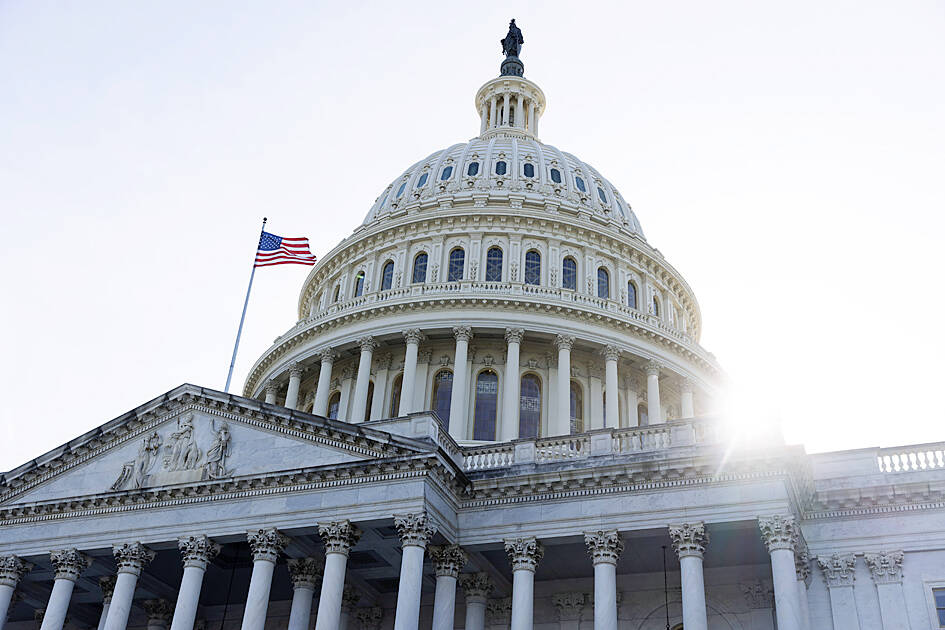The US House of Representatives Appropriations Committee on Monday introduced a bill which would provide US$500 million in foreign military financing for Taiwan to bolster deterrence across the Taiwan Strait.
The Fiscal Year 2025 State, Foreign Operations, and Related Programs Bill would also offer Taiwan up to US$2 billion in loans and loan guarantees for the same purpose, the committee said.
Other efforts to curb the influence of the People’s Republic of China (PRC) found in the bill include providing US$2.1 billion for US national security interests in the Indo-Pacific region, as well as US$400 million in funding for the Countering PRC Influence Fund.

Photo: EPA-EFE
Appropriations Committee chairman Tom Cole of the Republican Party said the bill “sends a clear message that the United States will do what’s necessary to protect our interests.”
The bill is scheduled to be reviewed by the State, Foreign Operations, and Related Programs Subcommittee on Tuesday, but still has several hurdles to clear before it can become law.
The chairman of the subcommittee, Mario Diaz-Balart, also a Republican, said the proposed legislation would continue to advance global freedom and show strong solidarity with US allies.
It is aimed at “upholding key US priorities such as supporting strategic allies like Israel and Taiwan, and countering adversaries such as communist China, the terrorist states of Iran and Cuba, and terrorist organizations such as Hamas and Hezbollah,” he said.
In other news, Steven Rudder, a retired US Marine Corps officer, and representatives of 27 US defense contractors have arrived in Taiwan to meet with President William Lai (賴清德) and attend a forum to increase cooperation on defense technologies.
The group of defense industry representatives and Rudder arrived in Taiwan late on Monday to attend the Taiwan-US Defense Industry Forum to be held tomorrow, a source familiar with the matter said.
Aside from attending the half-day forum, the delegation would also visit Taiwan’s top military research unit, the Chungshan Institute of Science and Technology, and its chief aerospace company, Aerospace Industrial Development Corp (漢翔航空), to discuss potential cooperation on uncrewed aerial vehicles and defense technologies, the source said.
Organized by the Taipei-based Taiwan Defense Industry Development Association and the Arlington, Texas-based US-Taiwan Business Council, the forum is to feature addresses by representatives of the association and council, as well as by Rudder, the source said.
Rudder is a nonresident senior fellow in the Indo-Pacific Security Initiative at the Atlantic Council’s Scowcroft Center for Strategy and Security.
He retired as the commanding general of Marine Forces Pacific in September 2022 after leading an organization of 80,000 people responsible for all US Marine operations in the Asia-Pacific region, according to his Atlantic Council biography.
Chinese Nationalist Party (KMT) Legislator Chen Yeong-kang (陳永康), a retired navy admiral, is also to give a keynote address during the forum at the Taipei International Convention Center, which is to be attended by experts and representatives from defense companies.
Some of the topics to be touched on would be Taiwan’s domestic warship and warplane projects, and advanced defense technologies and drones, according to a tentative itinerary released by its organizers.

AGING: As of last month, people aged 65 or older accounted for 20.06 percent of the total population and the number of couples who got married fell by 18,685 from 2024 Taiwan has surpassed South Korea as the country least willing to have children, with an annual crude birthrate of 4.62 per 1,000 people, Ministry of the Interior data showed yesterday. The nation was previously ranked the second-lowest country in terms of total fertility rate, or the average number of children a woman has in her lifetime. However, South Korea’s fertility rate began to recover from 2023, with total fertility rate rising from 0.72 and estimated to reach 0.82 to 0.85 by last year, and the crude birthrate projected at 6.7 per 1,000 people. Japan’s crude birthrate was projected to fall below six,

US President Donald Trump in an interview with the New York Times published on Thursday said that “it’s up to” Chinese President Xi Jinping (習近平) what China does on Taiwan, but that he would be “very unhappy” with a change in the “status quo.” “He [Xi] considers it to be a part of China, and that’s up to him what he’s going to be doing, but I’ve expressed to him that I would be very unhappy if he did that, and I don’t think he’ll do that. I hope he doesn’t do that,” Trump said. Trump made the comments in the context

SELF-DEFENSE: Tokyo has accelerated its spending goal and its defense minister said the nation needs to discuss whether it should develop nuclear-powered submarines China is ramping up objections to what it sees as Japan’s desire to acquire nuclear weapons, despite Tokyo’s longstanding renunciation of such arms, deepening another fissure in the two neighbors’ increasingly tense ties. In what appears to be a concerted effort, China’s foreign and defense ministries issued statements on Thursday condemning alleged remilitarism efforts by Tokyo. The remarks came as two of the country’s top think tanks jointly issued a 29-page report framing actions by “right-wing forces” in Japan as posing a “serious threat” to world peace. While that report did not define “right-wing forces,” the Chinese Ministry of Foreign Affairs was

PREPAREDNESS: Given the difficulty of importing ammunition during wartime, the Ministry of National Defense said it would prioritize ‘coproduction’ partnerships A newly formed unit of the Marine Corps tasked with land-based security operations has recently replaced its aging, domestically produced rifles with more advanced, US-made M4A1 rifles, a source said yesterday. The unnamed source familiar with the matter said the First Security Battalion of the Marine Corps’ Air Defense and Base Guard Group has replaced its older T65K2 rifles, which have been in service since the late 1980s, with the newly received M4A1s. The source did not say exactly when the upgrade took place or how many M4A1s were issued to the battalion. The confirmation came after Chinese-language media reported